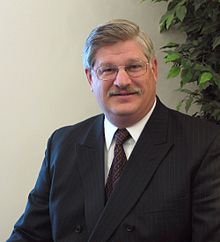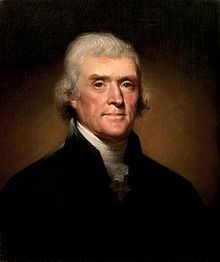 I recently read the Joel Rosenberg nonfiction work Inside the Revolution: How the Followers of Jihad, Jefferson & Jesus are Battling to Dominate the Middle East and Transform the World which was published in 2009. I wish I had read it earlier. This is the second of his nonfiction works — the first being Epicenter (which I have not read). I enjoy reading prophetic novels (not all folks do) and have read all of his fictional works. I have appreciated Rosenberg, not just for his writing, but from hearing him speak and do Q & A at the banquet of the Pre-Trib Study Group a few years ago. He stood his ground and refused to set dates and refused, correctly I believe, to senationalize in that regard.
I recently read the Joel Rosenberg nonfiction work Inside the Revolution: How the Followers of Jihad, Jefferson & Jesus are Battling to Dominate the Middle East and Transform the World which was published in 2009. I wish I had read it earlier. This is the second of his nonfiction works — the first being Epicenter (which I have not read). I enjoy reading prophetic novels (not all folks do) and have read all of his fictional works. I have appreciated Rosenberg, not just for his writing, but from hearing him speak and do Q & A at the banquet of the Pre-Trib Study Group a few years ago. He stood his ground and refused to set dates and refused, correctly I believe, to senationalize in that regard.
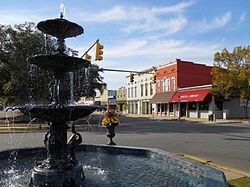 I have often mentioned in my blog entries my home state of Alabama and my affection for the Crimson Tide football team. However, my memories of my home state are far deeper than sports and more than merely a distant memory. I have lived in Pennsylvania now for 18 years, before that in Texas for 13 years, and before that in Virginia for 4 years. I left what I consider to be my hometown of Huntsville, Alabama in 1977. I remember the day well — it was the day that Elvis Presley died! However, my first exposure to the state of Alabama was not in Huntsville, a city nestled on the Tennessee River in the north part of the state. For a couple of years my Virginian parents moved the family to Eufaula, Alabama where my Dad worked at a military radar site. Eufaula is a city in the southern and eastern part of the state. It is a beautiful small Southern town located on the Chattahoochee river that separates Alabama from Georgia at that point. In fact, my twin brother and I finished out the first grade in a Georgetown, Georgia public school just across the river.
I have often mentioned in my blog entries my home state of Alabama and my affection for the Crimson Tide football team. However, my memories of my home state are far deeper than sports and more than merely a distant memory. I have lived in Pennsylvania now for 18 years, before that in Texas for 13 years, and before that in Virginia for 4 years. I left what I consider to be my hometown of Huntsville, Alabama in 1977. I remember the day well — it was the day that Elvis Presley died! However, my first exposure to the state of Alabama was not in Huntsville, a city nestled on the Tennessee River in the north part of the state. For a couple of years my Virginian parents moved the family to Eufaula, Alabama where my Dad worked at a military radar site. Eufaula is a city in the southern and eastern part of the state. It is a beautiful small Southern town located on the Chattahoochee river that separates Alabama from Georgia at that point. In fact, my twin brother and I finished out the first grade in a Georgetown, Georgia public school just across the river.
There are many memories of those days. I went bowling for the first time and fell in love with it. I began guitar lessons as a little boy with, of all people, my barber! I recall going to a parade, standing I think not far from the fountain shown in the picture of Eufaula above. As a young kid these were all new experiences for me that left deep and lasting impressions. I remember our little house on Sunset Drive and the playing of wiffle ball. One of the strongest recollections I have is Dad taking me to see my first high school football game to watch the Eufaula Tigers play and win 7-0. However, it is topped by the time my brother and I participated in some program put on by the elementary school. For our part, we played our guitars and sang the song “A Little Bitty Tear” (recorded by Burl Ives in 1961) to a large crowd in the high school gym. My parents were quite proud. All of these experiences combined to make our stay in Eufaula for those couple of years a happy one. However, there is one memory of note that is near the top and should not be left out — which is the main reason for my blog entry today.
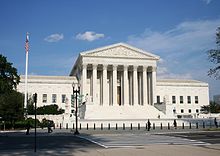 The most important decision issued by the U. S. Supreme Court this year was not its decision on President Obama’s healthcare legislation, important as that issue is for the future of America. The most significant ruling in my opinion was given in the Hosanna-Tabor case. This case was heard by the Court last October and the verdict given in January of this year (2012). I have a printed copy which can easily be found online.
The most important decision issued by the U. S. Supreme Court this year was not its decision on President Obama’s healthcare legislation, important as that issue is for the future of America. The most significant ruling in my opinion was given in the Hosanna-Tabor case. This case was heard by the Court last October and the verdict given in January of this year (2012). I have a printed copy which can easily be found online.
This case involved the dismissal of a called minister of a local Lutheran congregation. The issue started with some disability questions involving the minister and Christian school teacher. Eventually, the church had to give the position to another person in order for the ministry to be carried out. When the original minister wanted to come back and pursue the position again, the church refused — a course had been set. The minister challenged the decision to let someone else continue in the position. The church told the minister to follow the appeal procedures used within the Lutheran Church’s hierarchy to handle disputes. The minister refused and instead sued the Church. The Hosanna-Tabor congregation viewed this unwillingness to follow the procedures for handling disputes as insubordination and rescinded the call of this minister. The case went all the way to the Supreme Court.
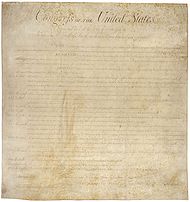 Much ink has been spilled and air time (radio and TV) dedicated to the recent mass shootings at the Century movie theater in Aurora, Colorado on July 20, 2012. The gun control crowd has used the occasion to push their agenda of limited availability of guns in our country. They want certain guns (and perhaps all guns) banned for purchase by the average citizen. Debate over where to draw the line on what kind of guns are to be banned is strong and heated. All of this is in spite of the Second Amendment to the United States Constitution which gives citizens the right to bear arms in self-defense. The Colorado tragedy is an event made for politicians to take advantage. Such hay-making by political types almost has a surreal quality to it. But it is to be expected. However, those of us who believe in the right to self-defense need to push back and make our feelings known as well. I personally believe that it is a spiritual action to defend one’s self or one’s family from harm. If a man broke into my house to try to kill my wife and kids, it would be a spiritual thing for me to kill him if necessary for their defense. Of course, no genuine believer should seek such an occurrence. It would be a tragic event even if done for right reasons. Christians would mourn the occasion. Nonetheless, it is possible to justify self-defense and family-defense from the Bible. I believe that this teaching is in the same category as the issue of just war theory. The ones who have authority to defend would be different of course, but in principle self-defense is a miniature version of just war – it would be a just killing action. I hope if such an occasion came into my life, God forbid, I would have the courage to do the right thing and protect my family.
Much ink has been spilled and air time (radio and TV) dedicated to the recent mass shootings at the Century movie theater in Aurora, Colorado on July 20, 2012. The gun control crowd has used the occasion to push their agenda of limited availability of guns in our country. They want certain guns (and perhaps all guns) banned for purchase by the average citizen. Debate over where to draw the line on what kind of guns are to be banned is strong and heated. All of this is in spite of the Second Amendment to the United States Constitution which gives citizens the right to bear arms in self-defense. The Colorado tragedy is an event made for politicians to take advantage. Such hay-making by political types almost has a surreal quality to it. But it is to be expected. However, those of us who believe in the right to self-defense need to push back and make our feelings known as well. I personally believe that it is a spiritual action to defend one’s self or one’s family from harm. If a man broke into my house to try to kill my wife and kids, it would be a spiritual thing for me to kill him if necessary for their defense. Of course, no genuine believer should seek such an occurrence. It would be a tragic event even if done for right reasons. Christians would mourn the occasion. Nonetheless, it is possible to justify self-defense and family-defense from the Bible. I believe that this teaching is in the same category as the issue of just war theory. The ones who have authority to defend would be different of course, but in principle self-defense is a miniature version of just war – it would be a just killing action. I hope if such an occasion came into my life, God forbid, I would have the courage to do the right thing and protect my family.
Read the rest of this entry »
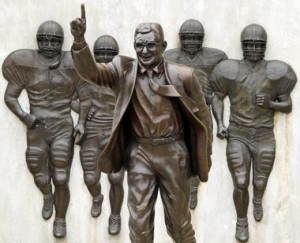 This weekend we saw the sad removal of the Joe Paterno statue that was outside Penn State’s football stadium. I had mixed feelings, understanding both the many good things that Paterno had stood for and, along with many others, the new revelations of Paterno’s conduct in the Sandusky sexual abuse scandal. Last September I had gone to a game at Penn State when my own team, the Alabama Crimson Tide, was visiting. I was able to see the statue, many of us taking pictures. This was before everything became public. I am glad that I got to experience the statue as it was meant to be. One of the problems that some have discussed on talk radio and elsewhere is the worship of a man that comes with such adulation that a statue is made of him–especially in the field of sports. There is also the worry that there is too much power in one individual without proper checks and balances in the institution. Nonetheless, I still had mixed feelings as they carted the statue away, wondering if it was not overkill. We must pray for those in authority at Penn State as they try to walk through the difficult maze they find themselves in at the present time. I would not want to change places with them. Read the rest of this entry »
This weekend we saw the sad removal of the Joe Paterno statue that was outside Penn State’s football stadium. I had mixed feelings, understanding both the many good things that Paterno had stood for and, along with many others, the new revelations of Paterno’s conduct in the Sandusky sexual abuse scandal. Last September I had gone to a game at Penn State when my own team, the Alabama Crimson Tide, was visiting. I was able to see the statue, many of us taking pictures. This was before everything became public. I am glad that I got to experience the statue as it was meant to be. One of the problems that some have discussed on talk radio and elsewhere is the worship of a man that comes with such adulation that a statue is made of him–especially in the field of sports. There is also the worry that there is too much power in one individual without proper checks and balances in the institution. Nonetheless, I still had mixed feelings as they carted the statue away, wondering if it was not overkill. We must pray for those in authority at Penn State as they try to walk through the difficult maze they find themselves in at the present time. I would not want to change places with them. Read the rest of this entry »
 This year a group of traditional dispensational professors from several different schools will descend upon the College of Biblical Studies in Houston, Texas for meetings on October 3-4. They will be joined by pastors, students, and other observers, especially from the Houston metropolitan area. This will be the fifth annual meeting of the Council. However, it will be the first not held at Baptist Bible Seminary. The decision has been made to meet in a different part of North America every other year. The goal is to network more broadly with traditional dispensationalists, both professors and pastors. Next year (2013) we will be back on the beautiful campus of Baptist Bible College & Seminary in Clarks Summit, Pennsylvania.
This year a group of traditional dispensational professors from several different schools will descend upon the College of Biblical Studies in Houston, Texas for meetings on October 3-4. They will be joined by pastors, students, and other observers, especially from the Houston metropolitan area. This will be the fifth annual meeting of the Council. However, it will be the first not held at Baptist Bible Seminary. The decision has been made to meet in a different part of North America every other year. The goal is to network more broadly with traditional dispensationalists, both professors and pastors. Next year (2013) we will be back on the beautiful campus of Baptist Bible College & Seminary in Clarks Summit, Pennsylvania.
The theme for this year’s 2012 Council is “Dispensationalism and Biblical Preaching.” Although we are sometimes accused of a theology based upon “simple Bible readings” mixed with “presupposed theological systems,” we are not embarrassed by a focus on inductive Bible study and expository preaching. Not all traditional dispensationalists, however, preach consistently with what they believe biblically and theologically. There is too much application without exposition. One can find strange typology popping out at certain points. The development of themes sometimes sloganizes the Bible instead of providing genuine exposition of the sacred text. This ought not to be so. If anyone should practice biblical expository preaching, it is traditional dispensationalists!
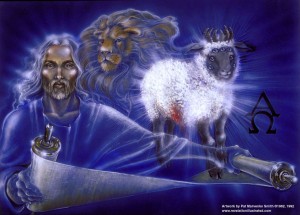 Often overlooked is the role that the book of Revelation can play in apologetics. One can start with the idea that Revelation provides many of the harsh things of Christianity: a coming Tribulation of great catastrophe poured out on all the earth (6-19), the judgments upon unbelievers when Jesus returns to earth at the Tribulation (19), and the final and ultimate judgment of the Great White Throne judgment (20). This of course includes the unending torment of a place called the lake of fire (20:10-15). A reasonable soul might ask the question, “What gives God the right to pour out all of this judgment in this life and the next?”
Often overlooked is the role that the book of Revelation can play in apologetics. One can start with the idea that Revelation provides many of the harsh things of Christianity: a coming Tribulation of great catastrophe poured out on all the earth (6-19), the judgments upon unbelievers when Jesus returns to earth at the Tribulation (19), and the final and ultimate judgment of the Great White Throne judgment (20). This of course includes the unending torment of a place called the lake of fire (20:10-15). A reasonable soul might ask the question, “What gives God the right to pour out all of this judgment in this life and the next?”
God gives clear responses to such questions in Revelation itself. First, men receive the judgments during the tribulation because they deserve it. Several texts in the book declare God’s ways are just and true (15:3, 16:5, 19:2). Added to this description of God’s ways in 16:5 is the understanding that the wicked deserve such judgment because “they poured out the blood of saints and prophets, and Thou hast given them blood to drink” (16:6).
Revelation also reminds us that God has the right to pour out such horrible judgments because He is the Creator: “Worthy art Thou, our Lord and our God, to receive glory and honor and power; for Thou didst create all things, and because of Thy will they existed, and were created” (4:11).
In perhaps the strongest answer given in the book, the question is asked who is worthy to open the scroll to unleash the judgments written on it (5:2-4). The only One worthy to open the scroll and pour out judgment is the Lamb of God who is God the Savior (5:5-8). Why? He is worthy because he was slain for our sins and purchased our salvation for God with his blood (5:9-10).
In this way, Revelation is not simply about worship and judgment. It is a theodicy which vindicates the way God’s end time judgments occur understanding that people deserve the judgments and that God is the Creator and Redeemer. In this way, Revelation has a purpose in apologetics that goes beyond knowing the end time events.
The picture above is my all time favorite Bible illustration. It is from the Revelation Illustrated series — Artwork by Pat Marvenko Smith, c1982, 1992; www.revelationillustrated.com. I purchased the set of pictures and have found them helpful in my teaching ministry in school and church.
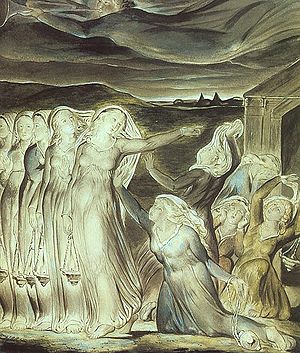 In the Olivet Discourse in Matthew 25:1-13, Jesus gives the Parable of the Ten Virgins which highlights the necessity for those people alive during the tribulation to be ready for the Second Coming of Christ. Certainly there would be the same need to be ready before the rapture of the church in a pretrib scheme, although that is not the focus of this chapter in my judgment. One of the interesting questions is whether the Ten Virgins represent Israel. This is argued in the Bible Knowledge Commentary. To be sure, Jesus speaks to the apostles in the Olivet Discourse as representatives of a future generation of Jews (those in the tribulation period) – note the symmetry provided by the end of Matthew 23 which points back and Matthew 24-25 which points forward. Furthermore, we know that Matthew’s Gospel is the most Jewish of the Gospels and deals with Jewish interests more than other Gospel authors. In addition, the Jewish custom of marriage feasts is highlighted in the parable. The groom picks up his bride and takes her to his house for a wedding feast where there will be many guests. This marriage feast represents God’s coming kingdom when Jesus returns. Not all will be ready. Five virgins make it in to the feast (kingdom) but five do not.
In the Olivet Discourse in Matthew 25:1-13, Jesus gives the Parable of the Ten Virgins which highlights the necessity for those people alive during the tribulation to be ready for the Second Coming of Christ. Certainly there would be the same need to be ready before the rapture of the church in a pretrib scheme, although that is not the focus of this chapter in my judgment. One of the interesting questions is whether the Ten Virgins represent Israel. This is argued in the Bible Knowledge Commentary. To be sure, Jesus speaks to the apostles in the Olivet Discourse as representatives of a future generation of Jews (those in the tribulation period) – note the symmetry provided by the end of Matthew 23 which points back and Matthew 24-25 which points forward. Furthermore, we know that Matthew’s Gospel is the most Jewish of the Gospels and deals with Jewish interests more than other Gospel authors. In addition, the Jewish custom of marriage feasts is highlighted in the parable. The groom picks up his bride and takes her to his house for a wedding feast where there will be many guests. This marriage feast represents God’s coming kingdom when Jesus returns. Not all will be ready. Five virgins make it in to the feast (kingdom) but five do not.
However, in spite of these seemingly good reasons, it is probably best not to see Israel represented in a symbolic way by the Ten Virgins. Instead, what Jesus is saying is probably simpler. He is basically using a cultural illustration that reminds the hearers and readers that not all will be ready for the Second Coming and the kingdom. More than Jews should be in view. We know from elsewhere in Scripture that many Gentiles will come to Christ during the tribulation (see the 5th seal in Rev. 6) and that the time of bitter distress will come upon the whole world and not just Israel (see Isa. 13:11, Rev 3:10, etc.). The judgment of the nations that follows later in Matthew 25 certainly involves Israel but highlights the judgment of Gentiles. In this light it is best to see Jesus warning all people of all ethnic groups to be ready for His coming.
I am currently reading the Pulitzer Prize winning historical work Washington: A Life by Ron Chernow (2010), given to me as a Father’s Day present by my son Phil and his wife Leah. Overall, I handily recommend it to readers interested in the details of the lives of the Founding Fathers of the United States. I find a lot of help in the details but at times I have some disagreements on certain points, not always minor. Let me list some of my observations:
- I have long held that George Washington was my favorite President based upon my studies (I started years ago with Irving’s work). Chernow’s work deepens this for me. I appreciate the presentation of both flaws and strengths. Yet, Chernow has a way with words that helps the reader to picture in full bloom the way that Washington was accepted as the great man of his times. Beyond that he adroitly shows why Washington deserved such credit in spite of his flaws.
- Washington’s greatest contribution may not have been the tone he set for the first presidency. It was probably, in my opinion, his holding together of a straggly bunch of ragamuffins known as the Continental Army. Their survival for over eight years was nothing short of the miraculous. Chernow does a better job than most of delving into the details of Washington’s attempts to get the States and Congress to help his army, usually with failure. Yet, somehow they managed to stay together and surprisingly win the Revolutionary War, albeit with French help as we all know.
Read the rest of this entry »
Kevin Bauder, former President of Central Baptist Theological Seminary and current Research Professor of Systematic Theology at Central, recently wrote a book, published by Regular Baptist Press, entitled Baptist Distinctives and New Testament Church Order. Earlier this week I purchased the book at the annual meeting of the General Association of Regular Baptist Churches and attended a workshop where Kevin interacted with many pastors on related issues (a workshop moderated by Kevin Mungons of RBP). I performed a hearty skim of the book and believe Kevin’s approach to Baptist distinctives is close to mine. I was especially pleased that the emphasis on the New Testament approach to the Church or – as Kevin says it – New Testament authority was dealt with first. I was also happy that Kevin said in the workshop that this single distinctive is the lynchpin for the other distinctives in the package that Baptists generally believe.
I think it is possible the Baptist historians have been better at identifying this lynchpin than Baptist theologians down through the years. At least discussions about the so-called “primitive” church are plentiful (see Armitage, Orchard, Vedder, etc.). While Baptist peoples have disagreed among themselves about whether the primitive or early biblical churches passed down the pattern for doing church in an unbroken chain through history (e.g., the landmark debate), one thing is clear. Baptists look to the New Testament for doing church. This makes them somewhat dispensational in disposition even if they don’t claim that label. Baptists do not go to the OT for the pattern for how to do church even though OT wisdom can certainly be a guide for life in applicatory ways. But the model is distinctively a NT one.
Out of this comes the main contribution of the modern Baptist movement in my opinion – the clarification of the significance of the local church. This concept moved into mainstream evangelicalism over time and became a major competing model for doing church.

